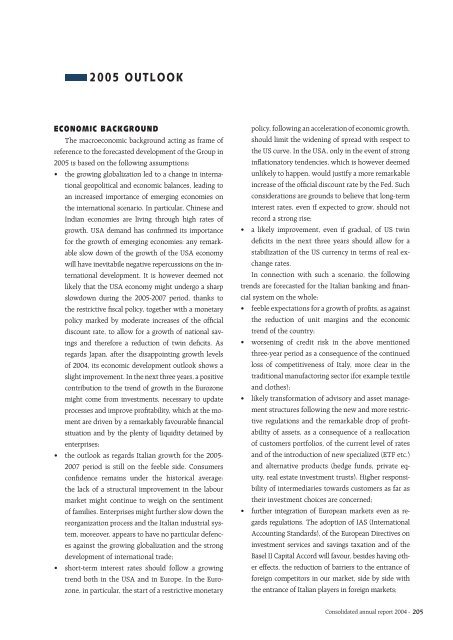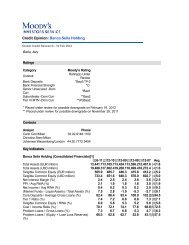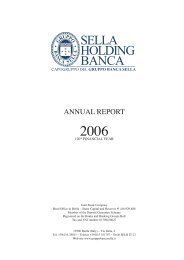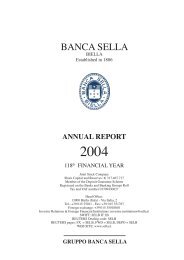consolidated annual report - Gruppo Banca Sella
consolidated annual report - Gruppo Banca Sella
consolidated annual report - Gruppo Banca Sella
You also want an ePaper? Increase the reach of your titles
YUMPU automatically turns print PDFs into web optimized ePapers that Google loves.
2005 OUTLOOK<br />
ECONOMIC BACKGROUND<br />
The macroeconomic background acting as frame of<br />
reference to the forecasted development of the Group in<br />
2005 is based on the following assumptions:<br />
• the growing globalization led to a change in international<br />
geopolitical and economic balances, leading to<br />
an increased importance of emerging economies on<br />
the international scenario. In particular, Chinese and<br />
Indian economies are living through high rates of<br />
growth. USA demand has confirmed its importance<br />
for the growth of emerging economies: any remarkable<br />
slow down of the growth of the USA economy<br />
will have inevitabile negative repercussions on the international<br />
development. It is however deemed not<br />
likely that the USA economy might undergo a sharp<br />
slowdown during the 2005-2007 period, thanks to<br />
the restrictive fiscal policy, together with a monetary<br />
policy marked by moderate increases of the official<br />
discount rate, to allow for a growth of national savings<br />
and therefore a reduction of twin deficits. As<br />
regards Japan, after the disappointing growth levels<br />
of 2004, its economic development outlook shows a<br />
slight improvement. In the next three years, a positive<br />
contribution to the trend of growth in the Eurozone<br />
might come from investments, necessary to update<br />
processes and improve profitability, which at the moment<br />
are driven by a remarkably favourable financial<br />
situation and by the plenty of liquidity detained by<br />
enterprises;<br />
• the outlook as regards Italian growth for the 2005-<br />
2007 period is still on the feeble side. Consumers<br />
confidence remains under the historical average:<br />
the lack of a structural improvement in the labour<br />
market might continue to weigh on the sentiment<br />
of families. Enterprises might further slow down the<br />
reorganization process and the Italian industrial system,<br />
moreover, appears to have no particular defences<br />
against the growing globalization and the strong<br />
development of international trade;<br />
• short-term interest rates should follow a growing<br />
trend both in the USA and in Europe. In the Eurozone,<br />
in particular, the start of a restrictive monetary<br />
policy, following an acceleration of economic growth,<br />
should limit the widening of spread with respect to<br />
the US curve. In the USA, only in the event of strong<br />
inflationatory tendencies, which is however deemed<br />
unlikely to happen, would justify a more remarkable<br />
increase of the official discount rate by the Fed. Such<br />
considerations are grounds to believe that long-term<br />
interest rates, even if expected to grow, should not<br />
record a strong rise;<br />
• a likely improvement, even if gradual, of US twin<br />
deficits in the next three years should allow for a<br />
stabilization of the US currency in terms of real exchange<br />
rates.<br />
In connection with such a scenario, the following<br />
trends are forecasted for the Italian banking and financial<br />
system on the whole:<br />
• feeble expectations for a growth of profits, as against<br />
the reduction of unit margins and the economic<br />
trend of the country;<br />
• worsening of credit risk in the above mentioned<br />
three-year period as a consequence of the continued<br />
loss of competitiveness of Italy, more clear in the<br />
traditional manufactoring sector (for example textile<br />
and clothes);<br />
• likely transformation of advisory and asset management<br />
structures following the new and more restrictive<br />
regulations and the remarkable drop of profitability<br />
of assets, as a consequence of a reallocation<br />
of customers portfolios, of the current level of rates<br />
and of the introduction of new specialized (ETF etc.)<br />
and alternative products (hedge funds, private equity,<br />
real estate investment trusts). Higher responsibility<br />
of intermediaries towards customers as far as<br />
their investment choices are concerned;<br />
• further integration of European markets even as regards<br />
regulations. The adoption of IAS (International<br />
Accounting Standards), of the European Directives on<br />
investment services and savings taxation and of the<br />
Basel II Capital Accord will favour, besides having other<br />
effects, the reduction of barriers to the entrance of<br />
foreign competitors in our market, side by side with<br />
the entrance of Italian players in foreign markets;<br />
Consolidated <strong>annual</strong> <strong>report</strong> 2004 - 205










